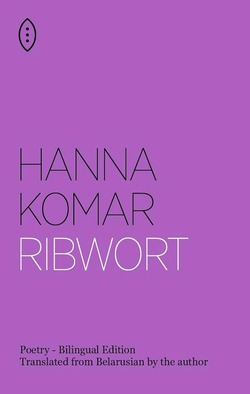Hanna Komar’s Ribwort (2022, tr: 2023) is a poetry collection that calls for healing, using the titular plant as a metaphor for soothing emotional wounds. It’s a bilingual edition, showing the poems in their original Belarussian alongside the poet’s translations. The first section showcases a series of personal poems that examine the poet and what has scarred her, while the latter part lifts us beyond introspection into the heart of a wider movement, of protest and solidarity as the wounded woman comes to represent her wounded motherland.
The opening poem, Dublin Night, sees Komar sitting in the Irish capital somewhat dissociated from the party atmosphere around her. Inviting the salve of another to “wrap around me / like ribwort” it hints at a need for affection and consolation, something that recurs through these poems. In Not What I Wanted Her To Be, she longs for a bedfellow to comfort her, using her mother’s methods as an example (“when I’d get sick as a child / she’d check my temperature / and give me medication / rather than lying next to me”) of what she doesn’t want.
Beyond familiar relationships, there are love interests, equally damaging. In Advice, a passing woman suggests her best outcome in life is to be married. In Through The Dark Woods she realises she’s not at the centre of the world, which becomes clear later in the quick one-two of Sharp – where “simply a rib removed” is a scalpel cut across the nature of a man “looking for / other smooth-skinned bodies” – and Non-Monogamy, where:
my river
nourishes plenty of life
but can’t
quench the thirst
of your roots
which are searching for
other springs.
But there are other concerns that link to inner turmoil. In Listen Komar castigates herself for not taking advice. In The Quiet of My Body a stomach churns as she struggles to grasp “my deafness to the polyphony of fate”. In A Book From the Sky her need for expression is in want of a voice. (“No matter how many voices / teach me to speak / I remain illiterate”).
Literacy, through many voices, comes when the poetry shifts to the national, observing the 2020 protests in Minsk. A dramatic account, based on an oral interview, of a couple’s taking to the streets against “a wall of police”, leading to torture and imprisonment. When Komar writes “And I limped / and limp-ed / and lim-p-ed / all the way to jail” we can practically see the pained movement. Where set-backs exist, hope and determination blooms in We Couldn’t Find You (“when it’s over / i will help you paint / these bare walls / white / red / white”), and the resistance is encouraged – at Niamiha, “One enough is not enough”; at Puškinskaja “we’re ninety-seven percent / and each one of us brings flowers.” – in the call for a better world for those Belarussians suffering, as Spring notes, “the accident of birth”.
It’s clear that the two sections work in tandem, with the first seeing Komar look to heal herself with the metaphorical ribwort, finding a voice, and in the latter part, on the streets of Minsk, a means to use it. Where the reflective poems are short and personal, their experiences pan out to the universal and timeless. The immediacy of the more blatantly political poems are charged with both anger and the freshness of the experience. Closing poem, When It’s Over, licks the bruises of recent years but sings with resolve (“we will tell / how we survived”) for the future, of the country, and those caught up in its turmoil for whom candles stay lit.
